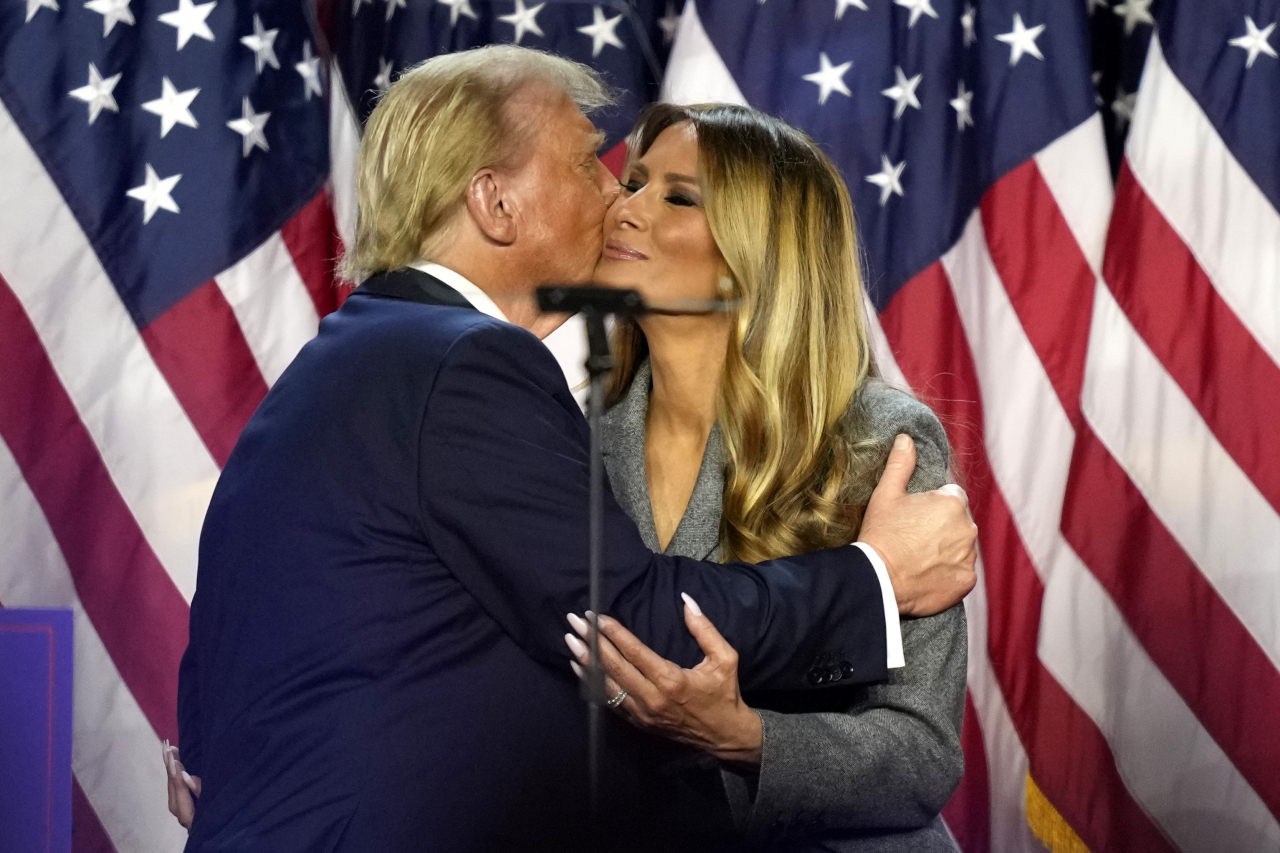 |
Republican flag-bearer President Donald Trump (left) kisses Melania Trump at an election night watch party in West Palm Beach, Fla. (AP-Yonhap) |
With former US President Donald Trump's successful reelection to the White House, South Korean industries with major investments in America may be expected to realign their US business strategies amid an anticipated shift in Washington's economic and trade policies.
Many in the South Korean business community forecast a second Trump administration to pursue strong protectionist trade policies centered on American interests. In particular, industries here are closely watching the possibility of Trump reducing or eliminating the CHIPS and Science Act and the Inflation Reduction Act, centered around the advanced tech and clean energy sectors.
Korea Ratings, a corporate ratings agency in Seoul, predicted in a recent report that while fully repealing the CHIPS Act could be difficult, Trump may offer stronger support for American companies, thus reducing subsidies for companies of allies and close partners.
Under the CHIPS Act, the US has provided subsidies for domestic and international semiconductor investments in America. South Korea's Samsung Electronics Co. and SK hynix Inc. have secured US$6.4 billion and $450 million, respectively, in grants from the US for their investments in the country.
"This could lead to reduced subsidies for allies and stricter conditions under guardrail provisions for foreign companies, potentially weighing down profitability by raising costs for facilities and operations," Korea Ratings assessed in the report.
Battery makers, already facing strong headwinds from a stagnation of global electric vehicle demand, could also face setbacks from Trump's policies.
Trump has stated he would pull back on the IRA, under which the government's advanced manufacturing production credits are helping companies make up for weakened earnings from the EV market slump in the United States.
Reducing the IRA and EV subsidies could stymie electric car adoption in the US, which would inevitably hurt the profitability of South Korean battery firms, such as LG Energy Solution Ltd. and SK On., which have made significant investments in America under the incumbent Joe Biden administration.
LG Energy Solution is either operating or constructing eight plants in North America -- two independent factories and six joint venture plants with General Motors, Honda Motor Co. and Hyundai Motor Group.
SK On, in partnership with Hyundai Motor Group, is building a joint plant in Georgia and is also constructing three other plants with Ford in Tennessee and Kentucky.
The Korea Institute for Industrial Economics and Trade said in a report last month that a Trump administration "could withdraw from the Paris Climate Agreement, roll back on fuel efficiency regulations for internal combustion engine vehicles and eliminate various requirements involving EVs."
If realized, such a move could weigh down on Hyundai Motor Group, which has made an aggressive push in the North American EV market as of late.
The South Korean automotive giant, which opened a new EV manufacturing plant, the Hyundai Motor Group Metaplant America, in the US state of Georgia this year, has keenly monitored for any changes around IRA-related incentives under a possible Trump return.
An automotive industry watcher, who asked not to be named, said the industry has closely monitored the US presidential race and the potential effects it could bring to the sector.
"Regardless of which candidate wins, we have looked to develop scenario-based strategies aimed at minimizing potential losses and maximizing gains," he said.
The South Korean government has reiterated that bilateral economic cooperation with the US will remain solid regardless of the election outcome.
"South Korea will work to strengthen ties with Washington in areas such as advanced industries and supply chains, leveraging existing channels of cooperation," Trade Minister Cheong In-kyo said in a meeting with officials last week.
"The trade authorities will also fulfill their duty to assist South Korean companies in reducing uncertainties and overcoming challenges in their operations," Cheong added, emphasizing that the US is a "very important" ally in terms of exports and investment. (Yonhap)







![[Herald Interview] How Gopizza got big in India](http://res.heraldm.com/phpwas/restmb_idxmake.php?idx=644&simg=/content/image/2024/11/20/20241120050057_0.jpg)